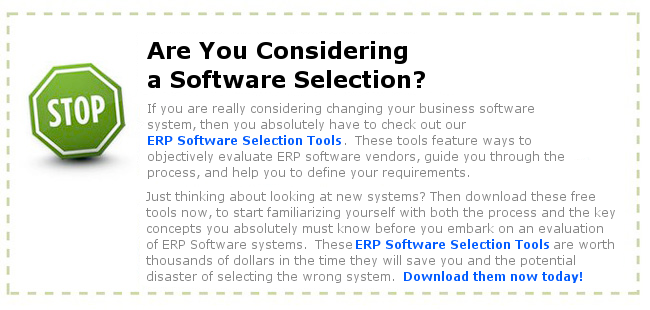Here is a basic overview of ERP. For people just starting it is a beginning primer on ERP software.
—
A Closer Look at the ERP Software Solution
Mike Piotrowski
ERP Solution
Information technology has not only transformed the way we live in modern society, but also the way in which we do business. Enterprise Resource Planning, often referred to as ERP, is becoming one of the most commonly used software systems in several industries and organizations. The object of this article is to provide pertinent highlights about exactly what ERP is.
The definition of Enterprise Resource Planning refers to not only software but also the business strategies employed as part of the implementation of ERP systems. This implementation makes use of various software applications in order to improve the performances of organizations in resource planning, control of operations, and control of management.
ERP software contains several software modules that work to integrate vital activities across operating departments. An ERP System not only includes the ERP Software but also the business processes and hardware that make this system work. These systems are more than the sums of their parts as the many components work together in order to achieve one common objective-to provide an organization with a greatly improved and streamlined business process.
History of ERP
ERP has been well over 20 years in the making. This system is the result of the trial, error, and growth of Manufacturing Requirements Planning (MRP) during the 80s. MRP was the evolution of Inventory Management and Control, which was conceived during the 1960s. ERP has grown beyond the coordination of manufacturing processes into the integration of back end processing on very large scales. From its origins as a legacy implementation ERP has morphed into a new and improved client-server architecture.
Benefits of ERP
This software attempts to bring all aspects of the business into one single enterprise-wide database or information system. This allows instantaneous information and communications to be shared between multiple departments. The primary benefit of this is a greatly improved efficiency in business operations. Implementing this system will not only help communications between departments but in day-to-day management functions as well. ERP is an ambitious design that also supports the resource planning part of corporate planning as this is often the weakest link in strategic planning as the result of the inadequate integration of ERP software with Decision Support Systems.
ERP Failures
It would be quite rude to conclude without at least mentioning the fact that failures in this system are occasionally reported in one of the four components of an ERP System. These systems are: ERP software, Business processes supported by the ERP System, Users of the ERP Systems, and the hardware and/or operating systems upon which the ERP applications are actually run. The failure of one or more of these components has the potential to cause the entire ERP project to fail.
Ontech Systems of Milwaukee Wisconsin, is committed to making a difference in your business through the productive use of computers, networks, software and the vast array of products and services we offer. Contact Michael Piotrowski, President of Ontech Systems to discuss a new ERP business solution for your company today.
